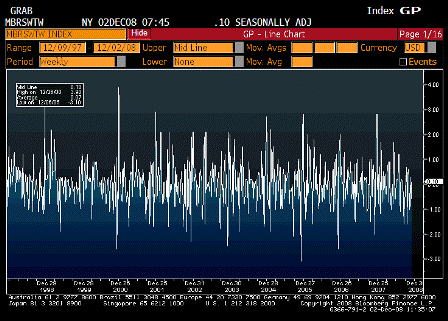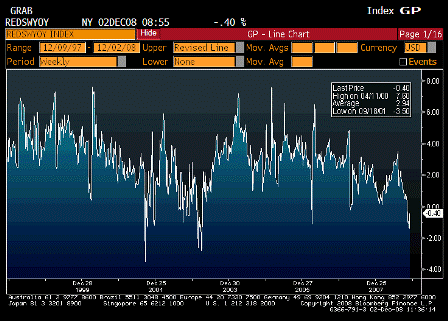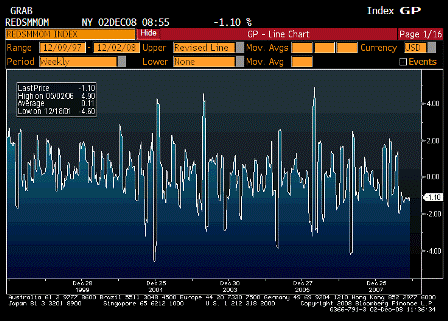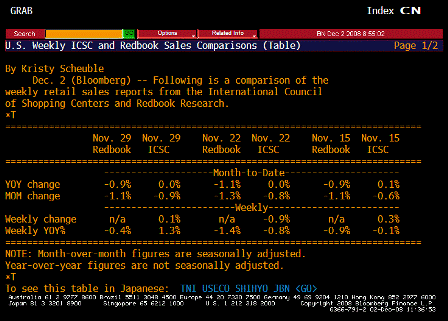$542.5 up $21.6 from last week
[top]

This sounds like they get it and are on it.
It also seems the weak yuan policy is back, as Paulson’s influence fades.
Paulson’s ‘beggar they neighbor’ weak dollar policy caused the US slowdown to spread worldwide.
Govt to increase spending power of rural residents
By Fu Yu
The Chinese government has reaffirmed its commitment to stabilizing the real estate and stock markets, and to boost auto sales.
The National Bureau of Statistics director Ma Jiantang said in a published article that the government would eliminate “consumption bottlenecks” to promote consumer demand. In the article published in Qiushi, a Communist Party journal, Ma wrote that the government would try to increase the spending power of lower income groups and to raise the desire to consume among the well-to-do.
The government has also planned to raise agricultural produce prices to help increase rural income levels. In addition, it will raise subsidies on seeding and farm machinery, and to increase some social benefits to farmers and low-salary rural workers.
In his analysis, Ma said consumers in rural areas have a strong potential demand for a wide range of consumer products and services.
He believes the $586 billion economic stimulus package will have the effect of encouraging increased spending by higher-income consumers, which will help boost investment.
[top]
Very interesting.
Seems the ECB can use this facility to ‘replace’ lost deposits of any bank, which would seem to remove the ‘bank run’ risk.
However, it is supposed to be only for very short term liquidity needs.
>
> On Wed, Dec 3, 2008 at 2:54 AM, Dave wrote:
>
> Not sure if any of the following is new info but was an interesting read
>
> DV
>
Emergency Liquidity Assistance in the euro area
A Belgian newspaper (La Libre Belgique) is currently running a fascinating series of articles on the collapse of Fortis and Dexia.
In one article (lalibre.be/economie/actualite/article/464148/chapitre-7-la-trahison-des-hollandais.html) it mentions that Fortis benefited from an Emergency Liquidity Assistance from the NBB at the end of September for an amount of about €50bn. This confirms our own findings that showed such a loan on the balance sheet of the NBB (most of it was in $, see NBB loans to Fortis: About €50bn at the end of September 2008, 16 October 2008).
What is interesting is that it sheds a bit more light on a mechanism that is available on a euro area basis, and that up until now had been referenced only infrequently by the ECB. For example, the December 2006 edition of the Financial Stability Review (p.171) has the following description:
“One of the specific tools available to central banks in a crisis situation is the provision of emergency liquidity assistance (ELA) to individual banks. Generally, this tool consists of the support given by central banks in exceptional circumstances and on a case-by-case basis to temporarily illiquid institutions and markets. This support may be warranted to ease an institution’s liquidity strains, as well as to prevent any potential systemic effects, or specific implications such as disruption of the smooth functioning of payment and settlement systems. However, the importance of ELA should not be over-emphasised. Central bank support should not be seen as a primary means of ensuring financial stability, since it bears the risk of moral hazard. Furthermore, ELA rarely needs to be provided, and is thus less significant than other elements of the financial safety net, which have increased in importance in the management of crises.”
Apparently, these credit lines can be given by the various national banks, against collateral (including all the buildings of the retail banks network, in the case of Fortis!) and a ‘high’ rate of interest. But these credit lines need to be approved first by the ECB Governing Council and all 15 governors of the individual central banks. According to press reports, in a few days at the end of September, there were no less than 15 ECB teleconference calls to approve such ELAs to Belgian banks (Fortis and Dexia) but also German and Irish banks (probably Hypo Re since the bailout was at about the same time).
Looking at the balance sheets of the individual central banks it is quite difficult to have a complete picture of how much of these ELAs have been extended: while it was relatively clearly identified on the NBB balance sheet, it does not look like it was the case on the Bundesbank balance sheet, and to our knowledge the ECB as such has not given any figure on such credit lines. It is interesting, though, that such a mechanism existed. It is still available if needed in case of emergency, even if to a certain extent the existence of the guarantee schemes (introduced after this) may make its use slightly less necessary.
In addition it seems that Trichet was quite involved in the discussions, warning that Fortis did not have enough liquidity even after the capital injection that occurred over the weekend of 27-28 September (the ELA was probably extended from the Monday onwards, and it was after the next weekend that the Fortis share price really took a dive to below 1).
[top]
(email exchange)
> On 12/3/08, Kevin wrote:
>
> Hi Warren,
>  
> The UK deficit and debt to GDP is increasing dramatically as the government
> seeks to stabilize the economy.
>
Yes, good move on their part. That will restore demand/output/employment.
>
> With the UK being a net importer of goods.
>
Yes.
>
> And sterling not benefitting from being a “reserve” or “commodity based
> price” currency.
>
Whatever that means with floating FX.
>
> What impact does the increased reliance on foreign based capital as a funding
> source for the government.
>
The government is not reliant on foreign based capital with it’s currency of issue. It spends first by crediting accounts at its own central bank, the offers those accounts interest bearing alternatives like guilts, etc..
>
> have on the price of sterling and gilt yields in the medium term?
>
The currency could go down relative to other currencies. It’s sure looked way over valued to me for quite a while. Even at one to one with the dollar prices would still be high there.
>
> Ask this question as it appears foreign investors are beginning to question
> whether the UK, with its huge reliance on the financial services industry, very
> low domestic savings ratio and a consumer that has incurred residential
> property debt levels dramatically in excess of those in the US, should be
> compared to Iceland and may suffer similar consequences if there was a
> dramatic loss of confidence in the UKs economic prospects.
>
Iceland’s problems are with external currency debt, and with a govt that doesn’t know how to best deal with private sector external currency issues.
>
> Many thanks
>
> Kevin
>
[top]
Last week’s swap line number reported by the Fed was down to $521 billion from $608 billion. While still a very large number, it is coming down, and hopefully will continue to do so.
However, the continued fall in commodities prices, particularly crude oil, means dollars are ‘harder to get’ for the foreign sector, as they must export more product to the US for the same amount of dollars. And with the US consumer weakening, obtaining $US via exporting to the US will be that much more problematic.
Here is what Chairman Bernanke said yesterday about the swap lines.
Federal Reserve Policies in the Financial Crisis
In our globalized financial markets, the provision of dollar liquidity has international as well as domestic aspects. To improve dollar funding conditions in important foreign markets, the Federal Reserve has approved bilateral currency swap agreements with 14 foreign central banks. Swap facilities allow each of the central banks involved to borrow foreign currency from the other; in this case, foreign central banks such as the Bank of Japan, the European Central Bank, the Bank of
England, and the Swiss National Bank
And the Bank of Mexico, and other lesser CB’s.
have borrowed dollars from the Federal Reserve to re-lend to banks in their jurisdictions.
Yes, it’s a case of $US loans to foreign governments.
This is functionally no different than the Fed buying, for example, Mexican $ bonds.
Because short-term funding markets are interconnected, the provision of dollar
liquidity in major foreign markets eases conditions in dollar funding markets globally, including here in the United States.
Yes, that is true.
Lending to those less credit worthy does decrease their demand to borrow USD.
And that’s exactly the reason the Fed is lending virtually unsecured to lesser credits- to get interest rates down?
On a risk/reward basis this makes no sense to me.
There are far less costly ways to get USD LIBOR down.
Importantly, these swap arrangements pose essentially no credit risk because our counterparties are the foreign central banks themselves, which take responsibility for the extension of dollar credit within their jurisdictions.
So lending to the Bank of Mexico poses no credit risk?
And the ECB is shell company not guaranteed by the national governments.
And they’ve been criticizing the banking industry for poor underwriting criteria- this is far, far worse.
And would Congress approve the purchase of foreign USD bonds solely as a means to lower USD LIBOR? Is Congress aware that the Fed is authorized to do this?
Hopefully we get lucky and all the central banks politely pay us back.
[top]
Deficits and the Future
By Paul Krugman
Right now there’s intense debate about how aggressive the United States government should be in its attempts to turn the economy around. Many economists, myself included, are calling for a very large fiscal expansion to keep the economy from going into free fall.
Sounds good.
Others, however, worry about the burden that large budget deficits will place on future generations.
OK.
But the deficit worriers have it all wrong. Under current conditions, there’s no trade-off between what’s good in the short run and what’s good for the long run; strong fiscal expansion would actually enhance the economy’s long-run prospects.
No, under any conditions coincident with a shortage of aggregate demand.
The claim that budget deficits make the economy poorer in the long run is based on the belief that government borrowing “crowds out” private investment  that the government, by issuing lots of debt, drives up interest rates, which makes businesses unwilling to spend on new plant and equipment, and that this in turn reduces the economy’s long-run rate of growth. Under normal circumstances there’s a lot to this argument.
Not true. There is never anything to this argument.
But circumstances right now are anything but normal. Consider what would happen next year if the Obama administration gave in to the deficit hawks and scaled back its fiscal plans.
Would this lead to lower interest rates? It certainly wouldn’t lead to a reduction in short-term interest rates, which are more or less controlled by the Federal Reserve. The Fed is already keeping those rates as low as it can  virtually at zero  and won’t change that policy unless it sees signs that the economy is threatening to overheat. And that doesn’t seem like a realistic prospect any time soon.
What about longer-term rates? These rates, which are already at a half-century low, mainly reflect expected future short-term rates. Fiscal austerity could push them even lower  but only by creating expectations that the economy would remain deeply depressed for a long time, which would reduce, not increase, private investment.
Both true.
The idea that tight fiscal policy when the economy is depressed actually reduces private investment isn’t just a hypothetical argument: it’s exactly what happened in two important episodes in history.
The first took place in 1937, when Franklin Roosevelt mistakenly heeded the advice of his own era’s deficit worriers. He sharply reduced government spending, among other things cutting the Works Progress Administration in half, and also raised taxes. The result was a severe recession, and a steep fall in private investment.
Yes, taxes were raised to pay for the new social security program and kept off budget. After the immediate economic setback they changed the accounting and put social security taxes on budget where they remain today. The lesson of public accounting for the government was and is that it best serves public purpose when it’s on a ‘cash basis’.
The second episode took place 60 years later, in Japan. In 1996-97 the Japanese government tried to balance its budget, cutting spending and raising taxes. And again the recession that followed led to a steep fall in private investment.
Yes, they kept pushing consumption taxes that set them back.
Just to be clear, I’m not arguing that trying to reduce the budget deficit is always bad for private investment. You can make a reasonable case that Bill Clinton’s fiscal restraint in the 1990s helped fuel the great U.S. investment boom of that decade, which in turn helped cause a resurgence in productivity growth.
No you can’t. The deficits of the early 90’s recession fueled the subsequent expansion, and the resulting surplus killed it, and we are still feeling the effects of those surplus years today.
What made fiscal austerity such a bad idea both in Roosevelt’s America and in 1990s Japan.
And the US in the late 90s- he conveniently bypasses that one?
were special circumstances:
No, fiscal austerity necessarily reduces aggregate demand.
in both cases the government pulled back in the face of a liquidity trap, a situation in which the monetary authority had cut interest rates as far as it could, yet the economy was still operating far below capacity.
Yes, because monetary policy- changing interest rates- doesn’t actually work as theorized by the mainstream.
And note that in the last year interest for savers has come down about 4% while interest charges for borrowers are about unchanged, or, in many cases, higher, as the spreads widened as the Fed cut rates. And in any case the non government is a net saver/net receiver of interest payments to the tune of the government’s outstanding treasury securities. So the largest consequence of last year’s rate cuts has been a cut in private sector interest income.
And we’re in the same kind of trap today  which is why deficit worries are misplaced.
At least he gets to the right place, even if it is via faulty logic.
One more thing: Fiscal expansion will be even better for America’s future if a large part of the expansion takes the form of public investment  of building roads, repairing bridges and developing new technologies, all of which make the nation richer in the long run.
Yes.
Should the government have a permanent policy of running large budget deficits? Of course not.
Why not, if demand is chronically weak, which it has been for a long time.
Although public debt isn’t as bad a thing as many people believe â€â€Â
True!
it’s basically money we owe to ourselves â€â€Â
Wrong reason :(
in the long run the government, like private individuals, has to match its spending to its income.
Wrong. He misses the difference between issuers of non convertible currencies with uses of those currencies.
The funds for us to pay taxes to come from government spending (or government lending). So government is best thought of as spending first and then collecting taxes or borrowing.
And every dollar of cash in circulation has to be from government deficit spending- funds spent but not yet collected for payment of taxes.
Etc.
Rookie mistake for a Nobel Prize winner not to see the difference between issuer and user of anything.
But right now we have a fundamental shortfall in private spending: consumers are rediscovering the virtues of saving at the same moment that businesses, burned by past excesses and hamstrung by the troubles of the financial system, are cutting back on investment.
Yes!
That gap will eventually close,
Not without sufficient deficit spending.
but until it does, government spending must take up the slack. Otherwise, private investment, and the economy as a whole, will plunge even more.
Yes!
How about a payroll tax holiday where the treasury makes the FICA payments for employees and employers, along with maybe $300 billion to the states for operations and infrastructure projects?
he bottom line, then, is that people who think that fiscal expansion today is bad for future generations have got it exactly wrong. The best course of action, both for today’s workers and for their children, is to do whatever it takes to get this economy on the road to recovery.
And keep it there.
Doesn’t he know about the ongoing ‘demand leakages’ taught in the text books? Tax advantaged pension funds, IRAs. insurance, and other corp reserves, etc. That grow geometrically (most years)?
And that’s why the full employment deficit is something like 5% of GDP, etc?
(If anyone knows Professor Krugman feel free to email this to him, thanks)
[top]
With no sign of a meaningful response, and, worse yet, no safe channel to get it done even if they wanted to, systemic risk in the eurozone continues to escalate.
Highlights
| European Manufacturing Contracts More Than Estimated |
| German Retail Sales Drop as Recession Damps Spending |
| Spanish Manufacturing Contracted at Record Pace in November |
| ECB to Cut Benchmark Rate 1/2 Point, Economists’ Survey Shows |
| EU’s Barroso Sees Right Conditions For ECB Rate Cut |
| Italy approves economic aid, boost for banks |
| European Government Bonds Gain on Signs Slump Is Deepening |
[top]

| Survey | n/a |
| Actual | 1.30% |
| Prior | -0.80% |
| Revised | n/a |

| Survey | n/a |
| Actual | 0.10% |
| Prior | -0.90% |
| Revised | n/a |

| Survey | n/a |
| Actual | -0.40% |
| Prior | -1.40% |
| Revised | n/a |

| Survey | n/a |
| Actual | -1.10% |
| Prior | -1.30% |
| Revised | n/a |

[top]
(email exchange)
Thanks, this is yet another example of the WSJ publishing and thereby promoting authors with no understanding of monetary operations, which means the WSJ editors don’t have any either.
Feel free to send this along the the WSJ with your own introductory comments as well!
>
> This is a well written piece, by Mr. Wood of CLSA.
>
I respectfully don’t agree.
>
> He has long maintained a bearish bias which comes through in the
> article. The points he raises I believe are cogent and logical and ones I
> have addressed as well over recent days and months.
>
It doesn’t seem you understand monetary operations either.
>
> The end of the article discussing gold I found to be particularly of
> interest.
>
The Fed Is Out of Ammunition: A Discredited Dollar Is a Likely Outcome of the Current Crisis
By Christopher Wood
With an estimated $4 trillion in housing wealth and $9 trillion in stock-market wealth destroyed so far in the United States, there is little doubt that we are witnessing a classic debt-deflation bust at work, characterized by falling prices, frozen credit markets and plummeting asset values.
Yes, as well as fiscal automatic stabilizers working their way to the rescue as always.
Those who want to understand the mechanism might ponder Irving Fisher’s comment in 1933: When it comes to booms gone bust, “over-investment and over-speculation are often important; but they would have far less serious results were they not conducted with borrowed money.”
Irv was writing in the context of the gold standard of the time, and that did very well.
But it’s inapplicable with today’s non convertible currency and floating FX.
The growing risk of falling prices raises a challenge for one of the conventional wisdoms of the modern economics profession, and indeed modern central banking: the belief that it is impossible to have deflation in a fiat paper-money system.
You can easily have deflation if the deficit is allowed to get and remain too small.
Yet U.S. core CPI fell by 0.1% month-on-month in October, the first such decline since December 1982.
Pull back in commodity prices mainly, after a long run up, but yes, for now the moment the outlook is deflationary.
The origins of the modern conventional wisdom lies in the simplistic monetarist interpretation of the Great Depression popularized by Milton Friedman and taught to generations of economics students ever since. This argued that the Great Depression could have been avoided if the Federal Reserve had been more proactive about printing money.
On the gold standard this might have worked, though it would have meant the need to rapidly devalue the conversion rate which would have considered a government default. And this did happen.
Today it is inapplicable with non convertible currency and floating FX.
Yet the Japanese experience of the 1990s — persistent deflationary malaise unresponsive to near zero-percent interest rates — shows that it is not so easy to inflate one’s way out of a debt bust.
Doesn’t show that at all. Just shows the depth of their reluctance to use sufficient deficit spending to restore output and employment via increased domestic demand. They want to be export driven and have paid the price for a long time.
In the U.S., the Fed can only control the supply of money;
No, it only can control the term structure of risk free interest rates.
it cannot control the velocity of money or the rate at which it turns over.
True.
The dramatic collapse in securitization over the past 18 months reflects the continuing collapse in velocity as financial engineering goes into reverse.
By identity.
True, this will change one day. But for now, the issuance of nonagency mortgage-backed securities (MBS) in America has plunged by 98% year-on-year to a monthly average of $0.82 billion in the past four months, down from a peak of $136 billion in June 2006. There has been no new issuance in commercial MBS since July. This collapse in securitization is intensely deflationary.
Yes, though offset by increased government deficit spending, increased export revenues (for a while), and increased direct lending by banks to hold in portfolio (which is how it was all done in not so distant past cycles).
It is also true that under Chairman Ben Bernanke, the Federal Reserve balance sheet continues to expand at a frantic rate, as do commercial-bank total reserves in an effort to counter credit contraction.
In an effort to lower rates and thereby counter credit contraction.
Thus, the Federal Reserve banks’ total assets have increased by $1.28 trillion since early September to $2.19 trillion on Nov. 19. Likewise, the aggregate reserves of U.S. depository institutions have surged nearly 14-fold in the past two months to $653 billion in the week ended Nov. 19 from $47 billion at the beginning of September.
So??? Just entries on a government spread sheet with no further ramifications.
But the growth of excess reserves also reflects bank disinterest in lending the money.
So?
This suggests the banks only want to finance existing positions, such as where they have already made credit-line commitments.
Banking is necessarily pro cyclical- get over it!
Monetarist Bernanke and others blame Japan’s postbubble deflationary downturn on policy errors by the Bank of Japan.
Not me. It was the lack of sufficient deficit spending, as above.
But he and others are about to find out that monetary gymnastics are not as effective as they would like to think. So too will the Keynesians who view an aggressive fiscal policy as the best way to counter a deflationary slump. While public-works spending can blunt the downside and provide jobs, it remains the case that FDR’s New Deal did not end the Great Depression.
Mixing metaphors. The New Deal’s deficit spending was far too small to restore output and employment.
There are no easy policy answers to the current credit convulsion and intensifying financial panic — not as long as politicians and central bankers are determined not to let financial institutions fail, and so prevent the market from correcting the excesses.
Yes there is an easy answer- make a sufficiently large fiscal adjustment.
This is why this writer has a certain sympathy for Treasury Secretary Henry Paulson, even if nobody else seems to. The securitized nature of this credit cycle, combined with the nightmare levels of leverage embedded in the products dreamt up by the quantitative geeks, means this is a horribly difficult issue to solve.
Couldn’t be easier. Start with a payroll tax holiday where the treasury makes all FICA payments for employees and employers.
The spread around a few hundred billion in revenue sharing to the states for operations and infrastructure.
Crisis over.
Virtually everybody blames Mr. Paulson for the decision to let Lehman Brothers go. But this decision should be applauded for precipitating the deflationary unwind that was going to come sooner or later anyway.
The Japanese precedent also remains important because the efforts in the West to prevent the market from disciplining excesses will have, as in Japan, unintended, adverse, long-term consequences.
Doesn’t even mention output and employment.
In Japan, one legacy is the continuing existence of a large number of uncompetitive companies which have caused profit margins to fall for their more productive competitors.
Who cares?
Another consequence has been a long-term deflationary malaise, which has kept yen interest rates ridiculously low to the detriment of savers.
Interesting bit of logic!
Meanwhile, the most recent Fed survey of loan officers provides hard evidence of the intensifying credit crunch in America. A net 83.6% of domestic banks reported having tightened lending standards on commercial and industrial loans to large and midsize firms over the past three months, the highest since the data series began in 1990. A net 47% of banks also indicated that they had become less willing to make consumer installment loans over the past three months.
Banks are necessarily pro cyclical- get over it!
Consumers are also more reluctant to borrow. A net 48% of respondents indicated that they had experienced weaker demand for consumer loans of all types over the past quarter, up from 30% in the July survey. This hints at the Japanese outcome of “pushing on a string” — i.e., the banks can make credit available but cannot force people to borrow.
Good! Lower taxes for any given amount of government spending. Bring it on! Now!
The Fed Is Out of Ammunition
With a fed-funds rate at 0.5% or lower in coming months, it is fast becoming time for investors to read again Mr. Bernanke’s speeches in 2002 and 2003 on the subject of combating falling inflation. In these speeches, the Fed chairman outlined how policy could evolve once short-term interest rates get to near zero. A key focus in such an environment will be to bring down long-term interest rates, which help determine the rates of mortgages and other debt instruments. This would likely involve in practice the Fed buying longer-term Treasury bonds.
Yes. And not do a lot for output and employment until fiscal adjustment takes hold.
And do we really want to encourage an increase in private leverage? Been there done that, right?
It would seem fair to conclude that a Bernanke-led Fed will follow through on such policies in coming months if, as is likely, the U.S. economy continues to suffer and if inflationary pressures continue to collapse. Such actions will not solve the problem but will merely compound it, by adding debt to debt.
I think he’s got it right there.
In this respect the present crisis in the West will ultimately end up discrediting mechanical monetarism —
Hope so. It flies in the face of theory and reality.
and with it the fiat paper-money system in general — as the U.S. paper-dollar standard, in place since Richard Nixon broke the link with gold in 1971, finally disintegrates.
Why??? Deflation as above? Deflation is the increase in value of a currency. Disintegration is via inflation???
The catalyst will be foreign creditors fleeing the dollar for gold. That will in turn lead to global recognition of the need for a vastly more disciplined global financial system and one where gold, the “barbarous relic” scorned by most modern central bankers, may well play a part.
Fleeing the dollar for gold means inflation. He’s been preaching deflation for this whole piece. Can’t have it both ways.
Mr. Wood, equity strategist for CLSA Ltd. in Hong Kong, is the author of “The Bubble Economy: Japan’s Extraordinary Speculative Boom of the ’80s and the Dramatic Bust of the ’90s” (Solstice Publishing, 2005).
Aha! Hong Kong has a fixed FX policy, much like a gold standard. He’s applying fixed FX analysis to the us which has a floating FX policy.
The WSJ should have told him this and rejected this op-ed piece.
[top]
Another tenth and the ECB will hit it’s inflation target for the first time since inception!
That’s why they called this the ‘beneficial recession.’
Just in time for year end performance bonuses…
Highlights
| Europe Inflation Rate Drops Most in Almost Two Decades to 2.1% |
| Trichet Says Stability, Growth Pact Must Be Fully Respected |
[top]